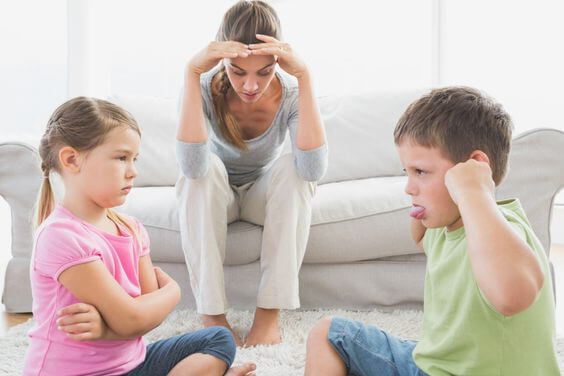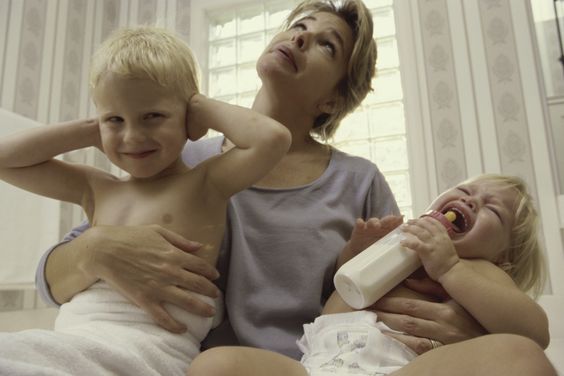Why Are Mothers More Stressed Than Fathers

Of course all parents and households are different, and the way some partners handle stress is different than others. However, studies show that fathers generally don’t suffer from the same type of stress as mothers do when it comes to taking care of their children.
Scientific results indicate that women tend to be more unhappy with parental responsibilities than men. Why does this occur? Do you agree?
Parenting implies a series of exhausting commitments. The routines, obligations and lack of personal time can become overwhelming. This seems to be much more complicated for women than for men.
We believe it has to do with the need that women have for perfection and the lack of help from their partners.
What happens when two people with the same routine are out of tune? In this situation, one person will likely end up doing most of the work. When a mother observes that her partner doesn’t help her or do things properly, it can become stressful.
When it comes to parenting, most fathers don’t have to take care of their children for long periods of time. It is usually rather temporary and this doesn’t lead to stress.
They know that when Mom arrives, he gets to hand over his shift. This doesn’t work the other way around, however. If mom is busy with the children, when dad arrives, she is not relieved from her duties.

What does the data say about stressed mothers?
The American University of Cornell conducted an investigation through the Minnesota Population Center. The study began by analyzing the amount of time that both men and women spend caring for their children. This study was enough to point out the abysmal differences.
According to the research results, not only do women spend more time parenting, but it is also an exhausting process. If the process was simple and fully satisfactory, the time in which it is carried out would not have a particularly negative effect on our nerves.
However, in cases like these, women were discovered to be evidently more stressed and less happy than men.
The researchers took note of 12 thousand cases. The parents’ feelings were studied in accordance to the use of their time. The research was conducted over a three-year time span.
The indicators they studied were the amount of time and the different type of activities carried out by mothers and fathers. They also took into account the environment in which the parents were parenting in.
Since the majority of parenting responsibilities are placed on the mother, the time they get to enjoy with their children is reduced. Mothers also didn’t get time to be alone with themselves. Fathers tend to adhere to their leisure time more often than mothers.
Mothers enjoy time with their children less
Let’s analyze the following situation: a father comes home after a hard day’s work. Meanwhile, the mother prepares dinner and the children watch television.
What does the father do? More often than not, he chooses the option of resting or sitting for a while with the children.
The mother, however, doesn’t have time for that. She has to continue cooking, then serving and then organize the kitchen. By the time they are done, they have already accumulated stress from all the household chores, children’s duties and perhaps her own work.
Sadly, after all of this, they are not able to take advantage of quality time neither with their children nor with their partner.
These types of situations can be repeated on different levels. For example, when a father has to take care of his child, he is likely to take them to the movies, to get ice cream or just play with them in the playground.
Mothers cannot act this way, as they have to keep working in order to make the other family members happy.

“When mothers are with their children, they are usually alone. When fathers are with their children they are more likely to have other adults nearby who can offer support. This helps us understand why fathers are less stressed with their children”
– Ann Meier. Sociologist.
It is also common for mothers to ask their partners to take the children to the park while she washes clothes or organizes the house. Just like always, we sacrifice ourselves for our family and we end up being unhappy with something that truly gives us a lot of pleasure.
Being a mother doesn’t make us unhappy, it’s the way we carry out motherhood – the demands that are placed on our shoulders.
The need we have to make sure the family is not lacking anything, is what ends up taking away time from us – time that we could enjoy with them.
Of course all parents and households are different, and the way some partners handle stress is different than others. However, studies show that fathers generally don’t suffer from the same type of stress as mothers do when it comes to taking care of their children.
Scientific results indicate that women tend to be more unhappy with parental responsibilities than men. Why does this occur? Do you agree?
Parenting implies a series of exhausting commitments. The routines, obligations and lack of personal time can become overwhelming. This seems to be much more complicated for women than for men.
We believe it has to do with the need that women have for perfection and the lack of help from their partners.
What happens when two people with the same routine are out of tune? In this situation, one person will likely end up doing most of the work. When a mother observes that her partner doesn’t help her or do things properly, it can become stressful.
When it comes to parenting, most fathers don’t have to take care of their children for long periods of time. It is usually rather temporary and this doesn’t lead to stress.
They know that when Mom arrives, he gets to hand over his shift. This doesn’t work the other way around, however. If mom is busy with the children, when dad arrives, she is not relieved from her duties.

What does the data say about stressed mothers?
The American University of Cornell conducted an investigation through the Minnesota Population Center. The study began by analyzing the amount of time that both men and women spend caring for their children. This study was enough to point out the abysmal differences.
According to the research results, not only do women spend more time parenting, but it is also an exhausting process. If the process was simple and fully satisfactory, the time in which it is carried out would not have a particularly negative effect on our nerves.
However, in cases like these, women were discovered to be evidently more stressed and less happy than men.
The researchers took note of 12 thousand cases. The parents’ feelings were studied in accordance to the use of their time. The research was conducted over a three-year time span.
The indicators they studied were the amount of time and the different type of activities carried out by mothers and fathers. They also took into account the environment in which the parents were parenting in.
Since the majority of parenting responsibilities are placed on the mother, the time they get to enjoy with their children is reduced. Mothers also didn’t get time to be alone with themselves. Fathers tend to adhere to their leisure time more often than mothers.
Mothers enjoy time with their children less
Let’s analyze the following situation: a father comes home after a hard day’s work. Meanwhile, the mother prepares dinner and the children watch television.
What does the father do? More often than not, he chooses the option of resting or sitting for a while with the children.
The mother, however, doesn’t have time for that. She has to continue cooking, then serving and then organize the kitchen. By the time they are done, they have already accumulated stress from all the household chores, children’s duties and perhaps her own work.
Sadly, after all of this, they are not able to take advantage of quality time neither with their children nor with their partner.
These types of situations can be repeated on different levels. For example, when a father has to take care of his child, he is likely to take them to the movies, to get ice cream or just play with them in the playground.
Mothers cannot act this way, as they have to keep working in order to make the other family members happy.

“When mothers are with their children, they are usually alone. When fathers are with their children they are more likely to have other adults nearby who can offer support. This helps us understand why fathers are less stressed with their children”
– Ann Meier. Sociologist.
It is also common for mothers to ask their partners to take the children to the park while she washes clothes or organizes the house. Just like always, we sacrifice ourselves for our family and we end up being unhappy with something that truly gives us a lot of pleasure.
Being a mother doesn’t make us unhappy, it’s the way we carry out motherhood – the demands that are placed on our shoulders.
The need we have to make sure the family is not lacking anything, is what ends up taking away time from us – time that we could enjoy with them.
All cited sources were thoroughly reviewed by our team to ensure their quality, reliability, currency, and validity. The bibliography of this article was considered reliable and of academic or scientific accuracy.
- Gorrita Pérez, R. R., Bárcenas Bellót, Y., Gorrita Pérez, Y., & Brito Herrera, B. (2014). Estrés y ansiedad maternos y su relación con el éxito de la lactancia materna. Revista cubana de pediatría, 86(2), 0-0. http://scielo.sld.cu/scielo.php?pid=S0034-75312014000200006&script=sci_arttext&tlng=pt
- Olhaberry, M., & Farkas, C. (2012). Estrés materno y configuración familiar: estudio comparativo en familias chilenas monoparentales y nucleares de bajos ingresos. Universitas Psychologica, 11(4), 1326-1326. https://revistas.javeriana.edu.co/index.php/revPsycho/article/view/1047
- Pérez-López, J., Pérez-Lag, M., Ramón, M. D. P. M., & Velasco, L. P. P. (2012). Estrés parental, desarrollo infantil y atención temprana. International Journal of Developmental and Educational Psychology, 1(1), 123-132. https://www.redalyc.org/pdf/3498/349832342012.pdf
This text is provided for informational purposes only and does not replace consultation with a professional. If in doubt, consult your specialist.








